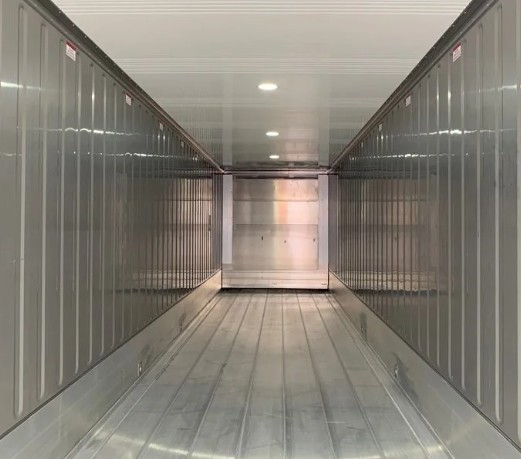Buying an Insulated Shipping Container? Here’s What You Need to Know
If you’re considering buying an insulated shipping container, you’re making a smart investment in temperature-stable, durable storage solutions. Unlike refrigerated containers that actively cool or heat the interior, insulated containers passively maintain a stable internal climate, protecting contents from extreme temperatures. Whether you need storage for agriculture, industrial materials, food products, or construction supplies, insulated containers offer a reliable and energy-efficient alternative.
What Is an Insulated Shipping Container?
Insulated containers are widely used across various industries, offering a balance between cost, efficiency, and durability. Unlike refrigerated containers, which require constant power to maintain temperature, insulated containers use passive temperature control to create temperature-stable storage solutions for sensitive goods. They are perfect for businesses looking to protect items from external temperature extremes without the added cost of refrigeration.
An insulated shipping container is a storage solution designed to minimize temperature fluctuations by using thick insulated walls. Unlike standard shipping containers, which are made from steel with no thermal resistance, insulated containers feature materials such as polyurethane foam, PIR insulation, or high-density insulation panels to keep stored items safe from heat and cold.

Key Features of Insulated Containers:
- Advanced insulation materials such as polyurethane foam and PIR insulation for better temperature control.
- Moisture-resistant and condensation prevention technology, ensuring stored goods remain dry and free from mold.
- Double-wall construction for added structural strength and durable construction.
- Customizable modifications, including ventilation valves, shelving, and ergonomic design for improved storage efficiency.
- Weather-resistant design, making them suitable for extreme winter conditions, coastal regions, and industrial sites.
- Thick insulated walls for temperature-stable storage solutions
- Humidity control & ventilation valves to prevent condensation problems
- Durable construction with double-wall insulation for long-term use
- Energy-efficient alternative to refrigerated containers
- Weather-resistant design for extreme winter conditions and high heat
Benefits of Buying an Insulated Shipping Container
Enhanced Energy Efficiency
Unlike refrigerated containers, insulated shipping containers do not rely on an external power source, making them an energy-efficient alternative. This results in lower operating costs and sustainable storage without the need for continuous refrigeration.
Versatile Storage Applications
Insulated containers are ideal for various industries, including:
- Cold chain logistics – Protect perishable goods without active cooling.
- Agriculture – Store fertilizers, grains, and livestock feed with moisture-resistant insulation.
- Industrial & construction – Secure bulk storage of sensitive equipment and materials.
- Retail & warehousing – Improve operational efficiency with temperature-stable inventory storage.
Cost-Effective Alternative to Refrigerated Containers
If you don’t require active cooling, an insulated shipping container is a cheaper and more energy-efficient option. These containers are ideal for businesses looking to store items that need protection from external temperature changes but do not require precise cooling or heating.
Protection from Temperature Fluctuations
Insulated containers keep interior temperatures stable, making them ideal for storing food products, chemicals, pharmaceuticals, and electronics that can be affected by extreme heat or cold. The temperature protection provided by these containers prevents condensation problems and preserves product quality.
Ideal for Agricultural and Industrial Use
Farmers and industrial businesses use insulated containers for grain storage, seed preservation, fertilizer protection, and temperature-sensitive machinery. Additionally, these containers are frequently used for bulk storage of climate-sensitive goods, ensuring protection against ambient temperature fluctuations.
Long-Lasting and Durable
Built from corrosion-resistant steel with reinforced insulation materials, insulated containers provide a long lifespan with minimal maintenance requirements. The structural strength of these containers ensures they can withstand heavy use in demanding conditions, such as marine environments and ISO standard transportation needs.
Things to Consider Before Buying an Insulated Shipping Container
Choosing the Right Insulation Material
- PIR insulation offers high R-value, making it an excellent choice for extreme conditions.
- Polyurethane foam insulation provides superior temperature stability and long-term durability.
- Microcellular polyurethane foam enhances moisture resistance and protects against condensation problems.
Understanding Load Capacity and Cube Space
- 20ft insulated containers offer compact storage for small businesses.
- 40ft insulated containers provide expanded cube space for large-scale storage needs.
- Consider structural strength and ISO standard compliance when choosing a container for shipping or stationary use.
New vs. Used Insulated Containers
- New insulated containers offer the best durability and insulation performance but come at a higher cost.
- Used insulated containers are more budget-friendly while still providing excellent protection for most applications.
Size Options: 20ft vs. 40ft Insulated Containers
- 20ft insulated containers are perfect for small businesses and compact storage needs.
- 40ft insulated containers provide double the storage space and are ideal for industrial or large-scale commercial use.
- If looking for a 20 ft insulated container for sale, check for load capacity and insulation efficiency.
Interior Modifications and Customization
Many businesses customize their insulated containers with shelving, ventilation, double doors, lighting, and reinforced doors to optimize storage efficiency. Insulated conex boxes can be modified for secure storage, office spaces, or temperature-sensitive warehouse needs.
Delivery and Placement
Consider factors such as site accessibility, foundation support, and necessary permits before purchasing an insulated container. Moisture-resistant placement and proper sealing ensure long-term performance.
Where to Buy an Insulated Shipping Container
Purchasing from a reputable supplier ensures you get a high-quality, well-maintained container that meets your storage needs. Companies like UC Containers offer used insulated shipping containers with fast delivery and customization options. Visit UC Containers to explore available insulated storage solutions.
Long-Term ROI and Sustainability
Investing in an insulated shipping container provides long-term value due to its durable construction, weather-resistant design, and cost-saving energy efficiency. Whether used for bulk storage, temperature-sensitive cargo, or secure storage, these containers offer high-impact polyethylene protection, proper sealing, and flexible power options for an optimized storage solution.
FAQ's
How does an insulated shipping container differ from a refrigerated container?
Insulated shipping containers passively regulate temperature without an active cooling system, while refrigerated containers require continuous power to maintain set temperatures.
Can I use an insulated container for cold storage?
Yes, insulated containers help maintain temperature stability, but they do not actively cool or freeze goods like a refrigerated container.
What industries benefit from insulated shipping containers?
Industries such as agriculture, pharmaceuticals, food storage, and industrial warehousing use insulated containers to protect goods from temperature fluctuations.
How long do insulated shipping containers last?
With proper maintenance, insulated shipping containers can last 20+ years, thanks to their corrosion-resistant materials and durable construction.
Are insulated containers customizable?
Yes! Many businesses modify their containers with shelving, ventilation systems, lighting, and additional doors for optimal storage efficiency.
Final Thoughts
Buying an insulated shipping container is an excellent investment for businesses and individuals who need reliable, energy-efficient storage. Whether you need a 20ft or 40ft insulated container, ensuring you choose the right size, condition, and features will help maximize your investment. Contact UC Containers today to find the perfect insulated container for sale that fits your needs!
Internal Links to Explore Further
- Where to Buy Shipping Containers Near Me
- Cheap Used Shipping Containers for Sale
- Best Online Marketplace for Shipping Containers
- How Much Does a 40ft Shipping Container Cost?
- Used vs. New Shipping Containers: Which Is Right for You?
- Shipping Container Sales for Businesses
- Where to Rent Shipping Containers for Storage
- How to Find Cheap Shipping Containers for Sale
- Best Place to Buy Shipping Containers Online
- Everything You Need to Know Before Buying a Container
Get quote!

No strings attached 💯
Pingback: The Ultimate Guide to Buying and Selling Shipping Containers - UC containers